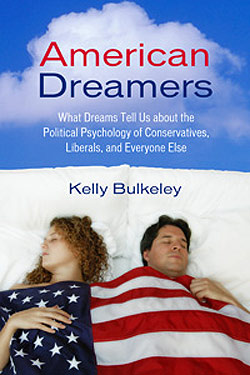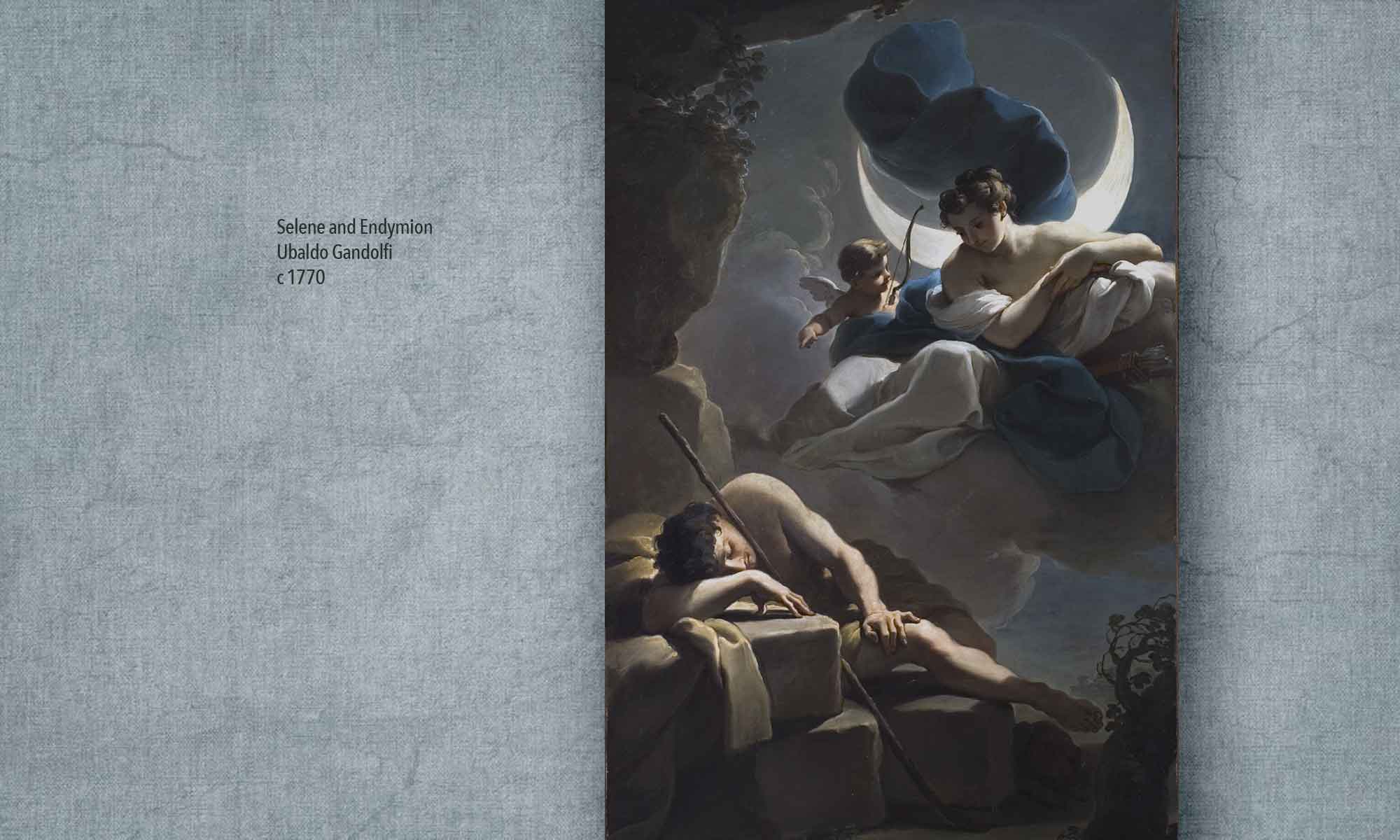 When politicians and pundits refer to the American Dream, they are evoking images of national unity, identity, and a better future. But in what ways does this metaphor manifest in the literal dreams of sleeping Americans? In American Dreamers, dream researcher Kelly Bulkeley takes the ideology of the American Dream one step further—into the study of actual dreams—to explore how the nocturnal side of human existence offers a key to the psychological origins of people’s waking beliefs and political passions.
When politicians and pundits refer to the American Dream, they are evoking images of national unity, identity, and a better future. But in what ways does this metaphor manifest in the literal dreams of sleeping Americans? In American Dreamers, dream researcher Kelly Bulkeley takes the ideology of the American Dream one step further—into the study of actual dreams—to explore how the nocturnal side of human existence offers a key to the psychological origins of people’s waking beliefs and political passions.
Building on sixteen years of scientific research involving thousands of dream reports, Bulkeley shows how the playful fancies of people’s dreaming imaginations can be interpreted as insightful expressions of their hopes and fears about issues as varied as the environment, religion, family values, and the Iraq war. Examining in particular detail the dreaming tendencies of conservatives and liberals, the book centers on ten people of different political perspectives—a dreamers’ focus group—who kept yearlong sleep and dream journals. The dreaming and waking stories of these “ordinary” Americans (among them a cancer survivor, a lesbian horse rancher, a former Catholic priest, a young waitress engaged to be married, and a soldier preparing for his third tour to Iraq) provide raw psychological material and a window into their deepest beliefs, darkest fears, and most inspiring ideals.
Hyper-ventilating political pundits have described in lurid detail what conservatives and liberals disagree about but rarely do they try to explain why they disagree—and that’s the real question. At a time of bitter partisan conflict and governmental paralysis, American Dreamers calls the country back to its visionary origins, arguing that dreams can serve as a royal road to the creation of new political solutions that integrate the best of conservative and liberal ideals. If we truly want to learn something new about the American Dream in people’s lives today, Bulkeley proposes we take a good, close look at how well American people are sleeping and dreaming at night.
Main findings:
1. Conservatives are more likely to sleep well and report fewer dreams, and liberals are more likely to sleep worse and report more dreams.
This is the overall conclusion of the sleep and dreams poll (sleep and dream poll results: political ideology), and it’s consistent with the same finding in my earlier studies (KB articles 2002 and 2006). It must be said, however, that some conservatives report many dreams, and some liberals report none; the distinctions are not absolute. In fact, the book’s analysis of more than 1500 dreams recorded in home journals by a group people with mixed political views (The 10 members of the “dreamers focus group”) reveals a much more complex psychological process at work, with conservative and liberal tendencies interacting in each person’s dreams in unexpected ways. Still, taking all the evidence as a whole, it seems fair to propose the working hypothesis that conservatives tend to be good sleepers and minimal dreamers, while liberals tend to be troubled sleepers and expansive dreamers.
2. The most religiously observant Americans (attend a worship service more than once a week) report better sleep and fewer dreams than the least religious Americans (never attend a worship service).
This was a surprising finding (sleep and dream poll results: religion), insofar as other research has indicated a close relationship between dreaming and religion (Dreaming in the World’s Religions: A Comparative History). These results may be due to a) the connection between religion and conservative politics in America, and/or b) the connection between American liberalism and a “spiritual but not religious” perspective. Chapter 3 looks at the religious and spiritual beliefs of the ten journal-keepers, who range across the spectrum from conservative Christian to liberal atheist.
3. A surprisingly frequent type of dream among both conservatives and liberals is a nightmare about work.
This is the most unexpected finding, because it reveals the impact of economic pressures on sleeping and dreaming in ways that no previous research has shown (sleep and dream poll results: economic status). Chapter 5 of the book discusses the economic circumstances of the focus group members, most of whom struggled financially during the journal-keeping year. Their job-related dreams reveal a profound populist frustration with the economic status quo.
4. The continuity of waking and dreaming extends to political ideals, beliefs, and attitudes.
Analysis of the dreams of the ten journal-keepers adds further evidence to the continuity hypothesis (www.dreamresearch.net), which says that dream content accurately reflects the most important concerns of the individual’s waking life. The findings in this book show that basic, easily identified patterns in dream content are continuous with a person’s most meaningful and emotionally intense relationships, activities, and beliefs. Those beliefs include a person’s attitudes toward politics. Perhaps one day we’ll be able to predict people’s political views with no information other than the patterns of their dreams.
Blurbs
“A beautifully written reminder of the depth of differences, and a dream of how difference might be understood. Bulkeley understands something profound about us; we would benefit enormously if we could even just glimpse that understanding.”—Lawrence Lessig, author of The Future of Ideas and Free Culture and Professor of Law, Stanford Law School
“No book about dreams could be more timely or more important than Kelly Bulkeley’s American Dreamers. Whatever is important in people’s waking lives is reflected in their dreams–politics included. American conservatives report different dreams than American liberals. American Democrats report different dreams than American Republicans. Dr. Bulkeley paints his portraits of American dreamers with a palette that reflects his scholarship in both religious studies and dream science; the results are filled with insights that will delight, amuse, and infuriate his readers. American Dreamers provides its readers with insight into the country’s future, insight that is available from no other (or better) source.”—Stanley Krippner, Ph.D., Co-author, Haunted by Combat: Understanding PTSD in War Veterans
“This story we tell ourselves in our dreams passes the impurities of our waking life through an ethical filter and exposes truths we have not yet acknowledged. American Dreamers is a comprehensive and very readable account of our unconscious adaptation of what is still a hazardous and imperfect waking domain. Bulkeley’s professional life has revolved around dreams and what we can learn from them. This book is true to its title. He has opened the door to the sociology of dreams.”—Montague Ullman, M.D., author of Appreciating Dreams: A Group Approach and Clinical Professor of Psychiatry Emeritus, Yeshiva University
“In this ground-breaking and timely work, Kelly Bulkeley uses the psychological analysis of dreams to plumb the depths of political, religious, and cultural realities. With an exemplary grasp of dream science built upon thousands of dream accounts, Bulkeley presents a multifaceted and nuanced portrait of the ways our deeply seated ideas, values, virtues, and fears become apparent within our dreams. American Dreamers challenges us to develop a greater understanding of and respect for all people across the political spectrum.”—Bonnie J. Miller-McLemore, author of In the Midst of Chaos and Let the Children Come
“Any political pundit who wants to speak with intelligence and genuine insight about the psychological motivations of American voters across the political spectrum would be well advised to read Kelly Bulkeley’s American Dreamers. Kelly Bulkeley is arguably the most rigorously empirical and psychologically subtle contemporary interpreter of the phenomenon of human dreaming. Over twenty-five years of writing and research is deployed in this urgently relevant, non-partisan, and broadly sympathetic analysis of the underlying psychological and spiritual concerns that unconsciously organize the political views of ordinary Americans today.”—John McDargh, author of Psychoanalytic Object Relations Theory and the Study of Religion and Associate Professor of the Psychology of Religion, Boston College
